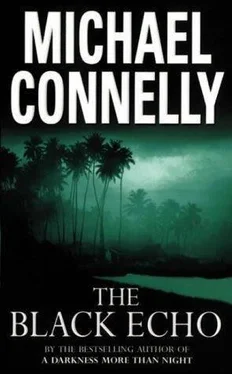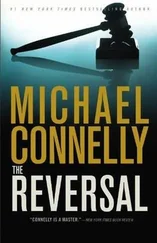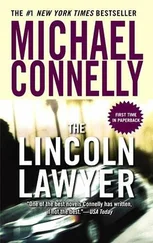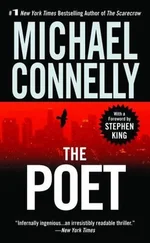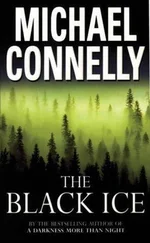“Came here when?”
“May 4, 1975.”
“Ah, right after the fall. I see. Tell me, what kind of homicide would the FBI and the LAPD be working on together that involves such ancient history, and history in another country as well?”
“Bob,” Eleanor began, “I think-”
“No, don’t answer that,” Ernst yelped. “I think you are right. It would be best if we compartmentalized the information.”
Ernst went through the motions of straightening his blotter and the knickknacks on his desk. Nothing was really out of order to begin with.
“How soon you need the information?” he finally said.
“Now,” Eleanor said.
“We’ll wait,” Harry said.
“You realize, of course, I may not come up with anything, especially on short notice?”
“Of course,” Eleanor said.
“Give me the name.”
Ernst slid a piece of paper across his blotter. Eleanor wrote Binh’s name on it and slid it back. Ernst looked at it a moment and got up without ever touching the paper.
“I’ll see what I can do,” he said and left the room.
Bosch looked at Eleanor.
“‘Ellie’?”
“Please, I don’t allow anybody to call me that. That’s why I don’t take his calls and don’t return them.”
“You mean until now. You’ll owe him now.”
“If he finds something. And so will you.”
“I guess I’ll have to let him call me Ellie.”
She didn’t smile.
“How’d you meet this guy, anyway?”
She didn’t answer.
Bosch said, “He’s probably listening to us right now.”
He looked around the room, though obviously any listening devices would be hidden. He took out his cigarettes when he saw a black ashtray on the desk.
“Please, don’t smoke,” Eleanor said.
“Just a half.”
“I met him once when we were both in Washington. I don’t even remember what for now. He was assistant something-or-other with State back then, too. We had a couple of drinks. That’s all. Sometime after that, he transferred out here. When he saw me in the elevator here and found out I was transferred, he started calling.”
“CIA all the way, right? Or something close.”
“More or less. I think. It doesn’t matter if he gets what we need.”
“More or less. I knew shitheads like him in the war. No matter how much he tells us today, there will be something more. Guys like that, information is their currency. They never give up everything. Like he said, they compartmentalize everything. They’ll get you killed before they tell it all.”
“Can we stop talking now?”
“Sure… Ellie.”
Bosch passed the time smoking and looking at the empty walls. The guy didn’t make much of an effort to make it look like a real office. No flag in the corner. Not even a picture of the president. Ernst was back in twenty minutes, and by then Bosch was on his second half-cigarette. As the assistant deputy for trade and development strode to his desk empty-handed, he said, “Detective, would you mind not smoking? I find it very bothersome in a closed room like this.”
Bosch stubbed the butt out in the small black bowl on the corner of his desk.
“Sorry,” he said. “I saw the ashtray. I thought-”
“It’s not an ashtray, Detective,” Ernst said in a somber tone. “That is a rice bowl, three centuries old. I brought it home with me after my stationing in Vietnam.”
“You were working on trade and development then, too?”
“Excuse me, Bob, did you find anything?” Eleanor interjected. “On the name?”
It took Ernst a long moment to break his stare away from Bosch.
“I found very little, but what I did find may be useful. This man, Binh, is a former Saigon police officer. A captain… Bosch, are you a veteran of the altercation?”
“You mean the war? Yes.”
“Of course you are,” Ernst said. “Then tell me, does this information mean anything to you?”
“Not a lot. I was in-country most of my time. Didn’t see much of Saigon except the Yankee bars and tattoo parlors. The guy was a police captain, should it mean something to me?”
“I suppose not. So let me tell you. As a captain, Binh ran the police department’s vice unit.”
Bosch thought about that and said, “Okay, he was probably as corrupt as everything else that went with that war.”
“I don’t suppose, coming from in-country, you know much about the system, the way things worked in Saigon?” Ernst asked.
“Why don’t you tell us about it? Sounds like that was your department. Mine was just trying to keep alive.”
Ernst ignored the shot. He chose to ignore Bosch as well. He looked only at Eleanor as he spoke.
“It operated quite simply, really,” he said. “If you dealt in substances, in flesh, gambling, anything on the black market, you were required to pay a local tariff, a tithe to the house, so to speak. That payment kept the local police away. It practically guaranteed your business would not be interrupted-within certain bounds. Your only worry then was the U.S. military police. Of course, they could be paid off as well, I suppose. There was always that rumor. Anyway, this system went on for years, from the very beginning until after the American withdrawal, until, I imagine, April 30, 1975, the day Saigon fell.”
Eleanor nodded and waited for him to go on.
“The major American military involvement lasted longer than a decade, before that there was the French. We are talking many, many years of foreign intervention.”
“Millions,” Bosch said.
“What’s that?”
“You are talking about millions of dollars in payoffs.”
“Yes, absolutely. Tens of millions when added up over the years.”
“And where does Captain Binh fit in?” Eleanor asked.
“You see,” Ernst said, “our information at the time was that the corruption within the Saigon police department was orchestrated or controlled by a triad called the Devil’s Three. You paid them or you did not do business. It was that simple.
“Coincidentally, or rather not coincidentally, the Saigon police had three captains whose domain corresponded, so to speak, quite nicely with the domain of the triad. One captain in charge of vice. One narcotics. One for patrol. Our information is that these three captains were, in fact, the triad.”
“You keep saying ‘Our information.’ Is that trade and development’s information? Where are you getting this?”
Ernst made a movement to straighten things on the top of his desk again and then stared coldly at Bosch. “Detective, you come to me for information. If you want to know where the source is, then you have made a mistake. You’ve come to the wrong person. You can believe what I tell you or not. It is of no consequence to me.”
The two men locked eyes but said nothing else.
“What happened to them?” Eleanor asked. “The members of the triad.”
Ernst pulled his eyes away from Bosch and said, “What happened is that after the United States pulled military forces in 1973 the triad’s source of revenue was largely gone. But like any responsible business entity they saw it coming and looked to replace it. And our intelligence at the time was that they shifted their position considerably. In the early seventies they moved from the role of providing protection to narcotics operations in Saigon to actually becoming part of those operations. Through political and military contacts and, of course, police enforcement they solidified themselves as the brokers for all brown heroin that came out of the highlands and was moved to the United States.”
“But it didn’t last,” Bosch said.
“Oh, no. Of course not. When Saigon fell in April 1975, they had to get out. They had made millions, an estimated fifteen to eighteen million American dollars each. It would mean nothing in the new Ho Chi Minh City and they wouldn’t be alive to enjoy it anyway. The triad had to get out or they’d face the firing squads of the North Army. And they had to get out with their money…”
Читать дальше
